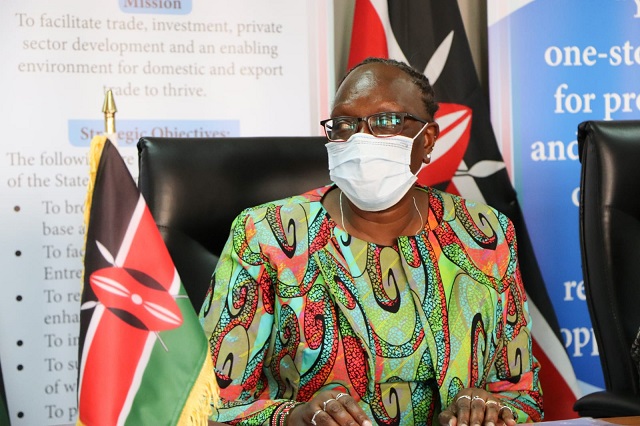
Kampala, Uganda | THE INDEPENDENT | Kenya has again appealed to Uganda for a joint strategy on accessing the European market through the stalled EU/EAC Economic Partnership Agreement (EPA).
Kenya also wants to partner with Uganda in negotiating a trade deal with the US as the the AGOA, the American Growth Opportunities Act nears expiry in 2025.
Betty Maina, Kenya’s cabinet secretary for trade says a joint approach would not only help Kenya and Uganda’s trade with the EU, but will also be a basis for a stronger East African Community.
Maina also thinks that if a deal was struck by the two nations with the EU, it would also encourage the other EAC member states to join in and make the agreement a fully EAC deal. She was speaking at the ongoing Uganda-Kenya Agri Business Exhibition in Mombasa.
She reminded her Ugandan counterpart Francis Mwebesa, that while in April, the two agreed to resolve a number of issues and have since fulfilled much of the promises, hence the need to move on.
Maina said they committed and did resolve all the issues notified to us by the business membership groups from both countries, we signed a joint communique on the issues that were there then including elimination of non compliant taxes and charges. “Unless we have new issues, my concern today would be the mechanisms both countries are putting together to address the common market access challenges facing EAC products in European Union through EAC-EU-EPA and United States through the AGOA framework,” she said.
She says poorer countries will only overcome challenges of accessing international markets if they make joint approaches. “To overcome these market access challenges, it is important for both Kenya and Uganda to present these issues jointly or under the EAC framework,” she said, adding that the two countries produce similar products, which would be an advantage.
Maina said that if products were exported as East African, it would be of a great advantage to the business community in the region. “Since we have very generous rules of origin, I am very sure that the business community will take the cue and start trading with the external markets under the common label and standard mark of the East African Community.”
The EAC countries have failed to agree on the EAC-EU EPA, with Tanzania and Burundi particularly opposed to it as dangerous to the local industry, and only beneficial to European exporters.
Kenya and Rwanda we’re ready to go, with Kenya having already ratified it, while Uganda opted to wait till a regional consensus was met. The EAC heads of States Summit gave a go ahead to the partner states that were willing to negotiate with he EU bilaterally, to implement parts or all of the provisions in the deal, which Kenya decided to do and negotiations are ongoing.
A similar approach is available for the EAC countries concerning the US market, as the AGOA initiative nears it’s expiry.
The US government agreed to sign a deal with Kenya about two years ago, and there is renewed pressure on Washington to see the deal through. Seven Republican Senators have written to the U.S. Trade Representative Katherine Tai, tasking her to hasten the process for a Free Trade Agreement by giving it priority after delaying for close to two years.
“A free trade agreement between the United States and Kenya is the appropriate next step in recognizing and strengthening relations, economic opportunities and a security partnership between the United States and Kenya,” the senators led by Oklahoma Senator Jim Inhofe, stated.
“I hope that the Chambers of both countries will consider having beyond this symposium joint marketing opportunities in markets beyond the EAC region,” Maina told the symposium under the theme “Unlocking the Full Potential of Agri-Business to Enhance Export Performance for National Development”.
However, Uganda’s Minister for Trade, Industry and Cooperatives, Francis Mwebesa insisted that non-tariff barriers between the two countries persist despite previous efforts to end them.
“We face significant Non-tariff barriers among ourselves, which are a hindrance to movement of goods and services; especially for Micro Small and Medium Enterprises and small cross-border traders, commitment and deliberate efforts to resolve the Non-tariff barriers should form the basis of consolidating our trade and economic ties,” says Mwebesa.
*****
URN
 The Independent Uganda: You get the Truth we Pay the Price
The Independent Uganda: You get the Truth we Pay the Price



